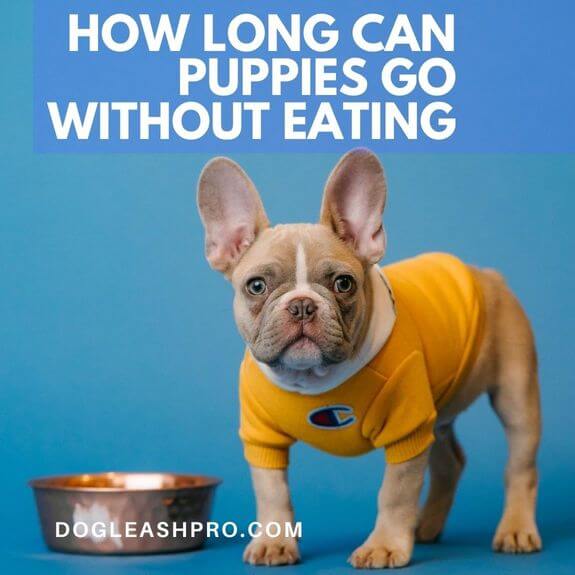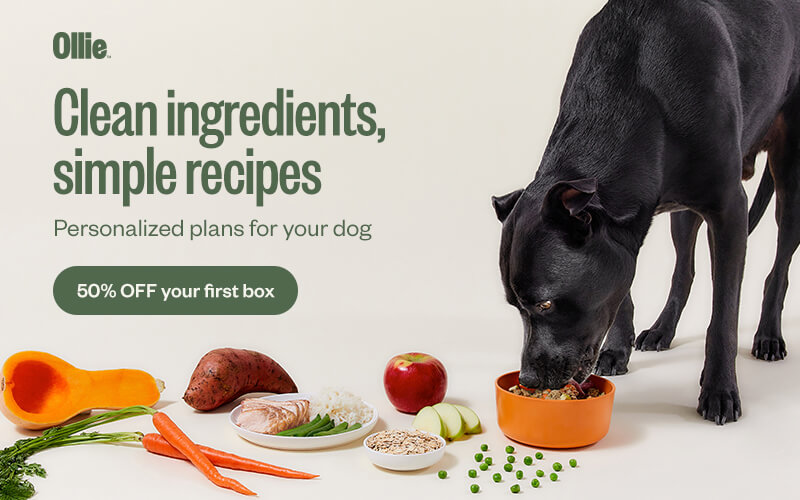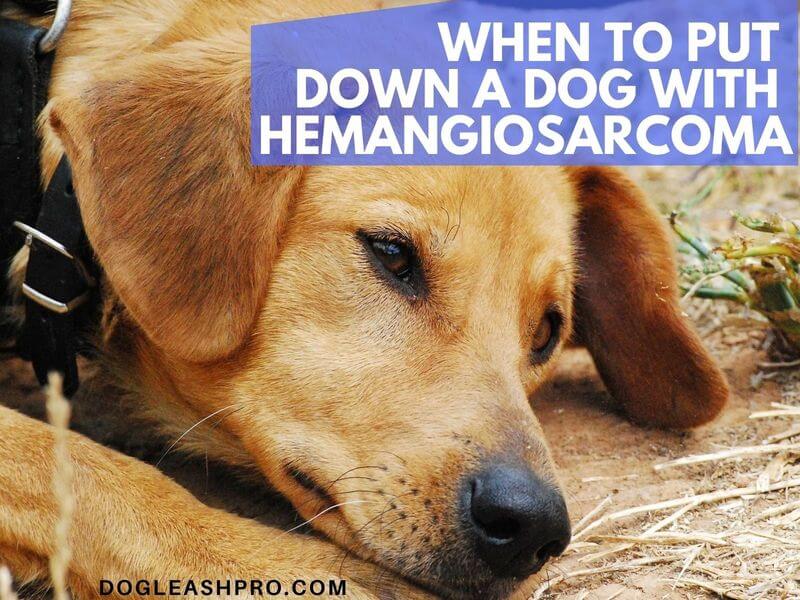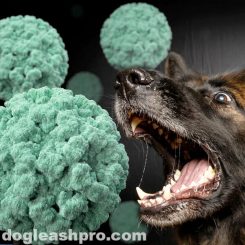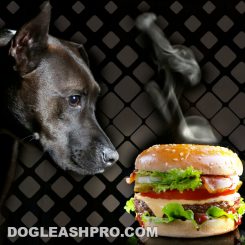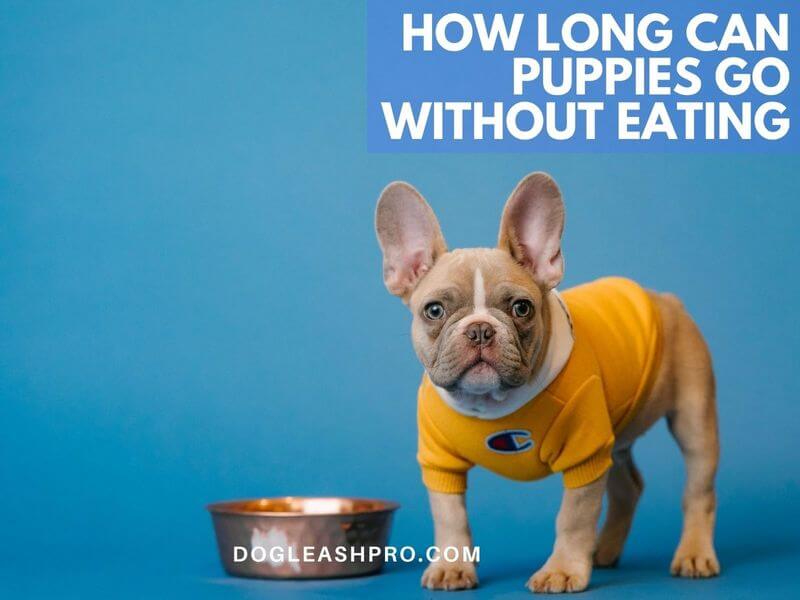
How long can a puppy go without eating? It depends on the age of the dog. A newborn puppy can go 2 hours without eating while older dogs can spend 5 hours comfortably before they have the urge to eat and drink again. It is not recommended to go any longer than this.
The survival of all living things is dependent on food. Your pup is no different. He also needs an adequate, balanced diet to remain healthy and happy. It is important to know how long your puppy can go without eating so you will know when to be concerned.
You may be asking this question because you’re bringing home a new puppy or have a sick pup that refuses to eat. If it’s the latter, make sure you know how to get your dog to eat when sick so he can heal properly.
Having sound knowledge about the feeding schedule can prove to be beneficial for both you and your pup. This article will answer all of your questions regarding your dog’s intake period whether he is 1 week or 5 months of age. So why wait, grab a cup of coffee, and dive in!
Table of Contents
How long can a puppy go without eating?
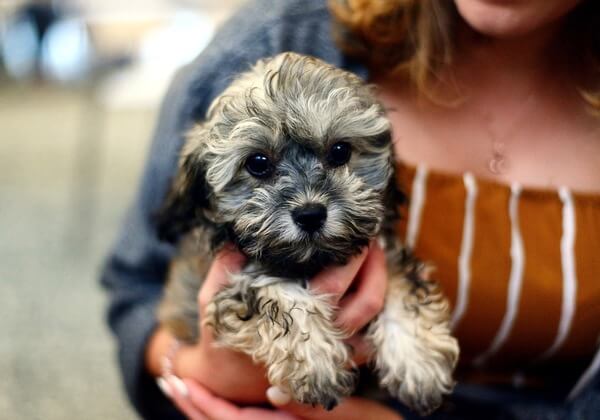
The eating schedule of a puppy depends highly upon the age of the dog. If the puppy is a newborn then it can go 2 hours without eating.
The older dogs can spend 5 hours comfortably before they have the urge to eat and drink again.
If a dog remains hungry for more than 5 to 6 hours, then it can potentially damage the health of the canine.
The only exception to the above-mentioned hours is during the night time when the dog falls asleep, but as soon as the pup wakes up he or she may begin to cry or whimper for food.
You may also be interested in: How Long Can A Dog Go Without Eating?
How long can a puppy go without eating after birth?
A newborn puppy is not able to see or walk. With the aid of the mother dog, the pup will sense where the chest is and will start suckling on them.
Usually, the nursing process starts immediately to provide the puppy with nourishment. In emergency conditions, the neonate puppies can go without eating for several hours as they hold on to the nutrients from the uterus.
It is highly advised that the starvation period should not be prolonged as it can lead to malnourishment, hypoglycemia, and dehydration. Right after birth to 4 weeks old, the puppies usually need to be fed every two hours.
How long can newborn puppies go without eating before dying?
A malnourished puppy is susceptible to falling ill because the immune system is not strong enough to fight off the diseases.
Under the supervision of the dog breeder or owner and the mother dog, the neonate puppy needs to be fed every two hours with its mother’s milk. This is important because it is the developing and growing stage of the newborn puppy.
If left unfed for more than 7 hours the newborn puppies can get sick with symptoms including weaker pulse, lack of energy, shivering, and fainting.
How long can a puppy go without water?
Did you know that our furry friends can only survive for about 2 to 3 days without water?
Water is crucial to our dog’s survival and health. Our canine companions need to be regularly hydrated so their vital organs in their bodies can function properly. Staying hydrated also allows dogs to stay cool and active.
Since dogs can’t survive long without water, it is essential that all responsible dog owners should provide clean fresh water for their pups every day. If you have indoor dogs, be sure to keep a water bowl next to your dog’s food bowl.
Most active puppies love to play outside on a nice warm sunny day. After a long hot day of play and physical activities, it’s best to place their water bowl either in your backyard or patio, whichever one is most convenient to your dogs.
It’s completely normal for puppies to stop drinking water, especially when they feel ill. If this is the case, we highly recommend that you monitor them closely. If they still refuse to drink water after 24 hours, reach out to your vet for help right away.
The good news is that there are other dog-friendly drink options you can try to get your dogs to drink and stay hydrated if they do not want to drink water.
Be mindful not to force your pooch to drink water. Ask your vet for advice on what you can do to help or if it is best to bring your pup into the vet’s office.
Your dog’s vet will most likely ask you to bring your pup in for a checkup in order to diagnose and treat the underlying cause of the problem.
There, your vet may also keep your dog hydrated with IV fluids.
When it comes to water consumption, an adult dog should drink one ounce of water for every pound he or she weighs.
For instance, if you have a Labrador that weighs 70 pounds, then you should make sure he has access to 70 ounces or about 2 liters of water every day.
You might also like: How Long Can A Dog Go Without Water?
How long can a puppy survive without food and water?
There are many factors involved in determining how long a puppy can survive without food and water such as:
- Age: an older dog can survive longer without food and water.
- Size: A bigger dog can withstand a longer duration of starvation.
- Breed
According to many vets, a dog can survive for 3 to 5 days or even longer without food. In the case of water, the canine can hold onto his dear life for 2 to 3 days without drinking any liquid.
Your dear doggie should not go through such harsh conditions because dehydration and lack of nutrients can badly mess up with its health.
When should I worry about my puppy not eating?
Puppies are unstable because they are young and underdeveloped. Due to this, they require more attention in all aspects. They are vulnerable to many things, including loss of appetite.
Not eating anything for a long time can be fatal! You should always take care of your puppy’s food intake.
Be sure to also feed your pup a proper, health, and well-balanced diet that suits their unique nutritional needs.
A great way is to feed your puppy Ollie Fresh Dog Food, which is made with fresh, healthy, and real human-grade ingredients.
If your pooch is still not eating after 5 hours, it is time to take action and yes, it’s time to be concerned. Your puppy could be stressed out or have a medical illness you’re not aware of so a visit to a vet is vital.
Nonetheless, if your pup is just 2 or 3 weeks old, they should be eating every 2 hours. If they haven’t been fed for more than 2 hours, it can be dangerous and you should see the vet as soon as possible and seek urgent veterinary attention.
Why is my puppy not eating?
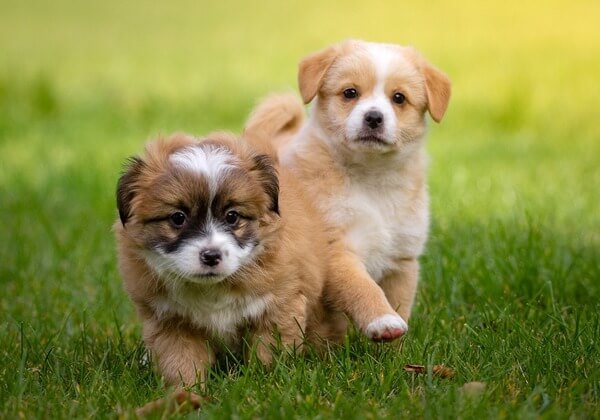
You should be worried if there is a sudden loss of appetite in your puppy. Eating and consuming more food is important for puppies. If the puppy refuses the food you serve, there must be some health reasons behind it.
Here are 9 reasons:
- Gut Infections. Many viruses tend to live in the dog’s digestive tract. For instance, dreaded Parvo or roundworms. These parasites can cause several problems.
- Stress. A puppy can get confused in a new environment which can lead to stress and lack of interest in food. It takes some time for the dog to accommodate.
- Pain. If the dog is suffering from pain due to some disease or injury then there are chances that it can turn away food.
- Upset stomach.
- Disliking the food.
- Not used to your way of feeding.
- Cold and seeking warmth. Puppies rely on their mothers for warmth. He may feel cold and miserable.
- Pickiness.
- Organ problem.
DON’T MISS: How Do I Know If My Puppy Will Survive Parvo?
Being a responsible pet owner you should regularly observe your dog’s eating habits and immediately get medical help if you are unable to solve the problem.
It is necessary to know the reasons behind why your puppy is not eating. When you know the reason, you will be able to get him back to eating again.
How long can a puppy go without drinking milk?
According to VCA Hospitals, during the first 2 weeks of life, puppies should eat 90% of the time. A nursing puppy gets all the essential nutrients from its mama’s milk.
The process of weaning starts when the puppies are 3 weeks old. The dogs get accustomed to food other than milk when they are 7 weeks old.
Unfortunately, if the puppy is rejected and left unfed by the mother for a longer duration then the chances of survival for such a dog are less.
The canine needs protein and immune system elements provided by their mother’s milk for protection against harmful diseases and infections.
How long can a 1-week old puppy go without eating?
A 1-week puppy is, of course, still too small and fragile. This newborn puppy has the tolerance to go without eating for just 2 hours.
Even when the puppy has reached 3 weeks of age after birth, he would still have the same vigor of going without food: 2 hours until he is older.
How long can a 4-week old puppy go without eating?
When puppies turn 4-week of age, they become stronger and are capable of surviving longer without food.
But it is advisable to feed them every 4 to 5 hours from their mother’s milk. If there’s an emergency and their mother is not available, you can provide them soft puppy food with a bit of water.
Puppies can go without eating for up to 5 hours but be careful not to exceed this time limit!
Nevertheless, the puppy can pull through 7 hours between feeding if an emergency strikes.
In the middle of 4 – 6 weeks’ age, puppies should be fed every 5 to 6 hours.
How long can an 8-week old puppy go without eating?
Ideally, an 8-week old puppy should not be left unfed for more than a few hours. A feeding schedule of 3 to 4 meals a day should be followed until the puppy is 12 weeks old.
The period of ‘no food’ can extend as the puppy gets older, bigger, and stronger. For instance, a six months old puppy can go without food for up to 7 hours.
How long can a 4-8 weeks old puppy go without eating?

In summary, your puppy can survive without eating for up to 5 hours when he is between 4 to 7 weeks, but we do not recommend your pup waiting this long as they are going through a developmental period.
If your puppy is between 6 to 8 weeks old, he can survive without eating for up to 8 hours. Again, be careful and try not to let this happen frequently. Otherwise, your puppy can get sick.
By the 4 to 8 weeks period, a puppy has aged somewhere between 22 to 42 days. With each passing week, the puppies grow older and start developing distinct structures and shapes.
At 4 weeks old, the diet of the puppy changes from solely on their mama’s milk to water and puppy kibble. As the dogs get older, the amount of food intake will increase while they gradually stop suckling their mother’s milk.
How long can a 2-month-old puppy go without eating?
A 2-month old puppy can go for up to 8 hours without eating. Two months for a dog is an age when his curiosities are at a peak and the pup is learning to become a responsible adult dog. He will usually be more active at this stage of life.
And as exercising (running or playing) increases their appetite, your pooch will be in need of more food to meet up the requirements of a healthy body.
Feed him somewhere between 4 to 5 times a day. As already mentioned, giving him food in halves is better. Therefore, try feeding him in chunks.
How long can a 9-week old puppy go without eating?
When a puppy turns 9 weeks old, he can go without eating for up to 8 hours, but we do not recommend this. His stomach’s capacity for food has increased a bit compared to that of an 8-week puppy.
So, ideally, a 63-day old puppy should be given food three to four times a day. It’s important to set a feeding schedule of every 3 to 4 hours.
The reason for feeding him several times a day is due to his digestive system and the tiny stomach. They can only cope with a certain amount of food.
His bathroom routine will also become more manageable when he is fed several times a day.
How long can a 12-week old puppy go without eating?
While a 12-week old puppy can go without eating for up to 12 hours, we do not recommend it at all. Instead, he should be fed at least 3 to 4 times a day. The ideal time for feeding a 12-week old puppy is no different than that of a 9 weeks old puppy.
If you feed him a certain amount of food twice a day, try splitting that into chunks that make up no less than 4 meals a day.
Feeding your pup at different time intervals is far better than feeding him all at once!
How long can a 5-month-old puppy go without eating?
Similar to a 12-week old puppy, a 5-month-old puppy can go without eating for up to 12 hours but we advised against this.
When the pups are young, they need to be fed more at different time intervals. But, when they grow older, you don’t necessarily have to do that.
The feeding schedule of a 5-month-old puppy can be divided into 2 to 3 meals per day. Gradually, reduce some food from the mid-day meal and increase in the dinner and breakfast.
You should always take care of this since overfeeding your dog can lead to several medical problems including obesity or joint issues. And if there is any need to reduce the amount of food as per the vet’s instruction, don’t hesitate, do it right away!
Food is their dependence for surviving, but this can also be the cause of their shorter lifespan at the same time, so beware!
How long can a puppy go without eating at night?
A dog that does not sleep well at night because of anxiety or health-related issues needs more attention and care during the night than a pup that is in a good physical and mental condition.
A perfectly healthy dog can go without eating or drinking the whole night.
Be prepared because as the doggie wakes up he/she will be ravenously hungry.
How long can a healthy dog go without eating?
If your dog is healthy, he won’t tell you when he is hungry. Nor will he starve himself but will survive for as long as he possibly can.
So you might wonder how long that period could be.
Generally, a healthy dog can go for 2 days with an empty stomach. After that, he will be starved enough to start consuming more. At times, your adult pooch can even fast for 7 days and more if he’s healthy!
Therefore, don’t worry too much if he is not eating anything for a day or two. But it is always suggested to look for the reason behind your dog not eating and never overlook this “not eating” behavior of your canine.
How long can an unhealthy dog go without eating?
Unhealthy dogs oftentimes lose their appetite and refuse food. If just one or two meals are missed, that should not cause much concern, but if it continues to happen, that’s frightening!
An unhealthy dog might go 48 hours without eating. But even if he misses 3 to 4 of his meals, you should be getting worried about him because he is already sick and needs nutrients to build up his immunity.
After 48 hours, you should immediately connect with a well-versed vet. The cause can prove to be dangerous as well. So, the sooner you go the better it is.
10 Reasons why my dog is not eating or drinking
The reasons why a dog doesn’t eat can be many; they can stretch from your dog’s misbehavior to severe health problems. When a dog refuses to eat, action should be taken or else problems can arise.
A dog doesn’t eat out of:
- Stress.
- Loneliness.
- Environmental changes.
- Nausea.
- Disease.
- Expired food (your dog has a 40 times greater power of smell than you do, check out the expiry dates before feeding him with the expired dog food.)
- Unwashed dishes.
- Vaccination – a reason for loss of appetite.
- Dental problems.
- Overfeeding.
5 Things you can do if your dog won’t eat
Is your dog not eating even when he is safe and healthy? Are you worried about what is causing him to do that?
No worries, we’ve got you!
Here are the 5 most useful things you can do to help get your dog back to eating.
- Investigate. This will let you know what makes your dog reject eating (knowing the core reason is important to take the next step).
- Try giving stage 2 baby food (mostly meat flavored like turkey or beef). But be sure the dog isn’t on a restricted diet and the food doesn’t have toxic things!
- Serve your pooch the home-cooked food.
- Praise every time he eats something.
- Go to your vet; he can guide you wholly to turn your pup back to eating!
What do vets do for a dog who won’t eat?
When you take your dog to the vet to know the reason why he is not eating, the vet will ask you about any signs you’ve noticed in your dog and his medical history.
For dogs that don’t eat or refuse to eat, the vet will first examine them thoroughly to reach the best suggestion. He/she will examine their teeth to know if that’s the source of the problem.
The vet may also take some tests like ultrasound, X-rays, urine, fecal samples, blood, and check for any disease or illness.
After diagnosing, your pup’s vet will be able to advise you on the best treatments available for your canine.
Final thoughts
To have a happy and healthy puppy, you will have to take good care of what he eats and when he eats.
If your four-legged pup, for some reason, refuses to eat, talk to a veterinary professional. He/she will let you know what can be done. Follow the vet’s instructions thoroughly so your furry companion is back to the same energetic and bouncy pup he was before.
Need not forget, your puppy wants you nearly as much as he wants food. So be with him and care for him!
Related Questions
Water is vital to survival and good health. It is not recommended that puppies go without water for a long time. Puppies can usually go without water for about 2 to 3 days. As you can see, dogs can only survive for a few days without water before they start to really experience the negative health consequences.
If your puppies refuse to drink water, there are other canine-friendly hydration options to try out. Be sure to check out our site to learn more! Keep in mind that your dog’s vet is always there to answer any question or concern you have and they are a great resource!
DISCLAIMER: THIS WEBSITE DOES NOT PROVIDE MEDICAL ADVICE
The information, including but not limited to, text, graphics, images and other material contained on this website are for informational purposes only. No material on this site is intended to be a substitute for professional veterinary advice, diagnosis, or treatment. Always seek the advice of your veterinarian or other qualified health care provider with any questions you may have regarding a medical condition.

With over five years of specialized experience as an animal writer, my expertise lies in dog nutrition, health, behavior, grooming, and training. I am dedicated to delivering helpful and informative content that caters to the well-being of our furry friends. My primary goal is to empower pet owners with knowledge and ensure our canine companions thrive in health and happiness. In my free time, I love volunteering at local dog rescue centers.
